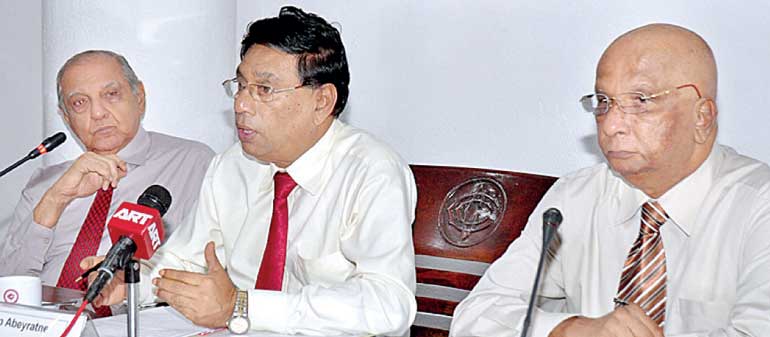Saturday Feb 14, 2026
Saturday Feb 14, 2026
Monday, 14 December 2015 00:10 - - {{hitsCtrl.values.hits}}
 SAPPTA Chairman Vernon Abeyratne flanked by Founder Chairman Gulam Chatoor (left) and Former Chairman M.C.M. Zarook at the media briefing on Friday– Pic by Lasantha Kumara
SAPPTA Chairman Vernon Abeyratne flanked by Founder Chairman Gulam Chatoor (left) and Former Chairman M.C.M. Zarook at the media briefing on Friday– Pic by Lasantha Kumara
 By Charumini de Silva
By Charumini de Silva
The Spices and Allied Products Producers and Traders Association (SAPPTA) on Friday hailed the 2016 Budget proposal to do away with the CESS imposed on exports, but urged the Government to stick to the proposal despite some wanting it continued.
SAPPTA Founder Chairman Gulam Chatoor said that to increase the exports keeping in line with the Government policy it is important to remove the CESS as proposed, adding that it would encourage farmers to increase their production.
However, he pointed that there would be some rethinking required to decide if CESS should be removed completely or alternatively continued for value addition purposes.
“Generally, the Government supports export related products, and we are not even asking for any kind of money. We are only asking to do away with the CESS so that it would have a positive impact on production and on productivity,” he stated at a media conference yesterday.
According to the budget proposal the CESS imposed on pepper, cloves and nutmeg would be removed in order to encourage export of spices. Currently a CESS of Rs.3 to Rs.10 per kilo is imposed on pepper, Rs.6 per on cloves and Rs.10 on nutmeg.
A SAPPTA former Chairman, M.C.M. Zarook said that the CESS fund has done nothing for the industry and funds collected over the years have been transferred into the Treasury.
Noting that the proposal made by the Government to allocate Rs. 150 million for branding and Rs.50 million for research was praiseworthy, he questioned as to why producers must back the CESS fund, when the Government has already allocated Rs. 150 million from the Treasury adding that they could use part of that fund for value addition.
“No other country in the world has imposed CESS on exports. In fact exports should be given incentives thereby, exports would increase and foreign exchange would increase; however in Sri Lanka CESS is imposed on a simple thing like spices,” he pointed out.
Zarook also said that Sri Lanka had not been successful in branding any of its products in the world market thus the allocated Rs.150 million should be carefully invested.
“We have to look branding in a broader perspective in order to pitch Sri Lankan spices to the top of the world,” he emphasized.
Highlighting key challenges Sri Lanka faces SAPPTA Chairman Vernon Abeyratne said there is not enough production for exports and suggested that contract cultivation should be encouraged as it contributes to the national wealth of the country.
There is a dire need to increase production and productivity in the industry. Some companies only work for six to eight months because they do not have enough supply to export, he said.
“We are pleased that the Government had considered our recommendation in providing uncultivated Government land to be handover to people to cultivate on a contract cultivation basis,” he added.
BOX
Govt. to set up a Cinnamon Authority to uplift industry
Bullets
SL has good scope on pepper
Laments about the BOI policies
Spice producers on Friday commended the 2016 Budget proposal to set up a Cinnamon Authority, noting the Government should also look at other spices that are picking up.
Pointing that Sri Lanka produces about 90% of the world’s cinnamon the Spices and Allied Products Producers and Traders Association (SAPPTA) said it was high time Government set up an institution dedicated to uplift the cinnamon industry.
“It is high time that we have an authority or a board for Cinnamon. We have boards dedicated for tea, rubber, coconut,” Zarook said.
He asserted that in the budget proposal there were many significant proposals dedicated for cinnamon, but at the same time, the Government should also look at other spices that are picking up pace in the export market.
Sri Lanka’s spice industry accounts for about 10% of the world production, which is insufficient compared to the competitors such as Vietnam, India, Indonesia and Malaysia. “Our production is about 32,700 tons as against world production of 362,000 — that is just nothing compared to the world production” he said.
Noting that Sri Lanka has quality pepper and has been in the industry for decades SAPPTA Founder Chairman Gulam Chatoor said it is easy to cultivate and double the current market share.
He pointed out that pepper has a good scope in the world market as world consumption has increased significantly. “If Sri Lanka could capitalize on the supply of pepper to the export market, we can easily double the market share, because our pepper quality is good, we have been in the business for decades and we know how to market it.”
Explaining that if the industry has sufficient production, they are in a position to do the value addition and exports Chatoor added, “What we need is more production and more production,”
In the case of pepper, the gestation period is less than three years, whereas the other two spices; nutmeg and cloves gestation period is longer, marketing is not easy as pepper.
“This is one of the reasons why we are emphasizing that the Government try removing the cesses thereby the prices can improve from the farmer’s level, production can go up and exports can go up,” he pointed.
SAPPTA Chairman Vernon Abeyratne drew attention to the existence of a sizeable BOI registered Indian company operating in Mirigama where it enjoys the best of being in Sri Lanka and not having to pay any cess.
“The association objected to the BOI condition, saying that they can give BOI approval, if the BOI Company signs an agreement to cultivate at least 500 acres of pepper. But it was never heard of and instead the said company gets raw materials from local farmers at a cheap price,” he said.
He went on to say that it is necessary to have investments in the country, but it should be a win- win situation. “The investment should have been on plantations to increase productivity not to buy what is already there in the country at a cheaper rate and sell it elsewhere.”